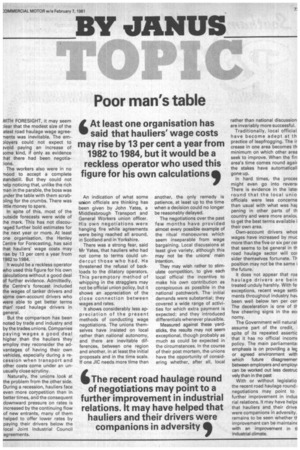BY JANUS
Page 75

If you've noticed an error in this article please click here to report it so we can fix it.
Poor man's table
L At least one organisation has w said that hauliers' wage costs may rise by 13 per cent a year from
1982 to 1984, but it would be a reckless operator who used this figure for his own calculations,
NITH FORESIGHT., it may seem lear that the modest size of the atest road haulage wage agreements was inevitable, The employers could not expect to avoid paying an increase of some kind, if only as evidence :hat there had been negotia:ions.
The workers also were in no mood to accept a complete -standstill. But they could not aelp noticing that, unlike the rich man in the parable, the boss was Jader the table with them scraboling for the crumbs. There was little money to spare.
In spite of this, most of the outside forecasts were wide of the mark. This has not discouraged further bold estimates for the next year or more. At least one organisation, the Henley Centre for Forecasting, has said that hauliers' wage costs may rise by 13 per cent a year from 1982 to 1984.
It would be a reckless operator who used this figure for his own calculations without a good deal of further evidence. Admittedly, the Centre's forecast included the wages of tanker drivers and some own-account drivers who were able to get better terms than" road haulage drivers in general.
But the comparison has been noted by trade and industry and by the trades unions. Companies paying wages a good deal higher than the hauliers they employ may reconsider the advantages of having their own vehicles, especially during a recession when transport and other costs come under an unusually close scrutiny.
Naturally, the unions look at the problem from the other side. During a recession, hauliers face even more competition than in better times, and the consequent downward pressure on rates is increased by the continuing flow of new entrants, many of them helped to offer lower rates by paying their drivers below the local Joint industrial Council agreements. An indication of what some union officials are thinking has been given by John Yates, a Middlesbrough Transport and General Workers union officer. His own negotiations were hanging fire while agreements were being reached all around, in Scotland and in Yorkshire.
There was a strong fear, said Mr Yates, that hauliers who had not come to terms could undercut those who had. He threatened the refusal of backloads to the dilatory operators. This peremptory method of whipping in the stragglers may not be official union policy, but it shows an appreciation of the close connection between wages and rates.
It shows considerably less appreciation of the present methods of conducting wage negotiations. The unions themselves have insisted on local rather than national autonomy, and there are inevitable differences, between one region and another, in at least the initial proposals and in the time scale. If one JIC needs more time than another, the gnly remedy is patience, at least up to the time when a decision could no longer be reasonably delayed.
The negotiations over the past few months have provided almost every possible example of the ritual manoeuvres which seem inseparable from wage bargaining. Local discussions at least give variety, although this may not be the unions' main intention.
They may wish rather to stimulate competition, to give each local official the incentive to make his own contribution as conspicuous as possible in the national patchwork. The initial demands were substantial; they covered a wide range of activities for which extra payment is expected; and they introduced differentials whenever plausible.
Measured against these yardsticks, the results may not seem exceptional, though probably as much as could be expected in the circumstances. In the course of their post mortem, the unions have the opportunity of considering whether, after all, local rather than national discussion are invariably more successful.
Traditionally, local official have become adept at th practice of leapfrogging. The ir crease in one area becomes th minimum on which other area seek to improve. When the fir: area's time comes round agair the stakes have automaticall gone up.
In hard times; the proces might even go into revers( There is evidence in the late: round that the local unio officials were less concerne than usual with what was har pening in other parts of th country and were more anxiot.. to get the best terms available i their own area.
Own-account drivers whos wages have increased by muc more than the five or six per cer that seems to be general in th road haulage sector will cor sider themselves fortunate. Th position may not be the same i the future.
It does not appear that roa haulage drivers are bein treated unduly harshly. With fe' exceptions, recent wage settli merits throughout industry ha% been well below ten per eon The deceleration is one of if few cheering signs in the ec( nomy.
The Government will natural assume part of the credit, spite of its repeated assertic that it has no official incomE policy. The main parliamentai emphasis is on providing a leg or agreed environment with which future disagreemer between employers and employ( can be worked out less destruc vely than in the past With or without legislatio the recent road haulage round' negotiations may point to further improvement in indus rial relations. It may have helpE that hauliers and their drive were companions in adversity. remains to be seen whether th improvement can be maintain€ with an improvement in ti industrial climate.












































































































